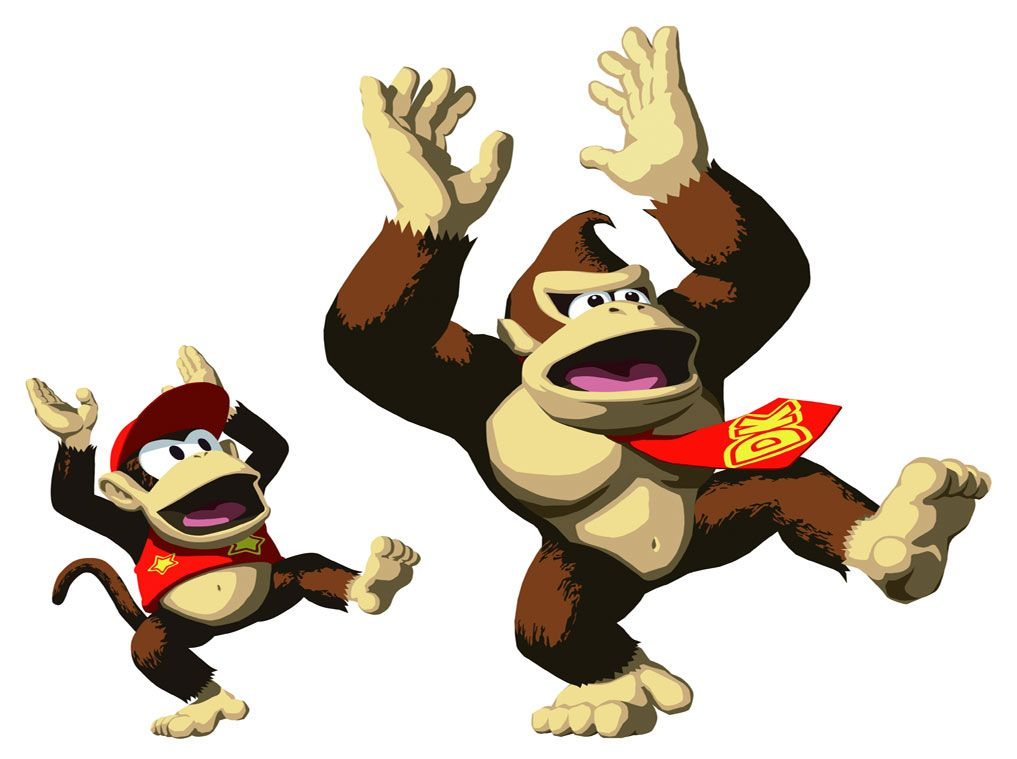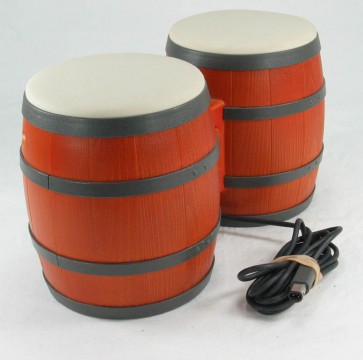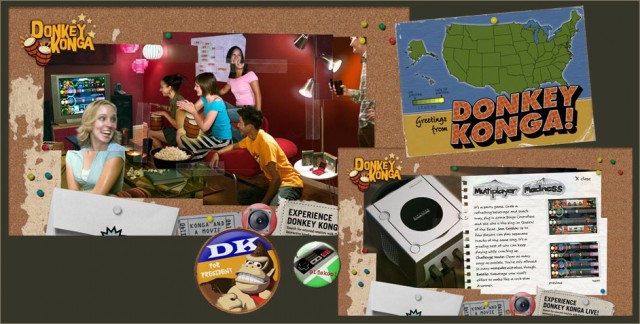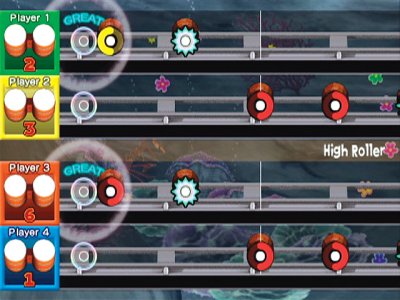
|
Seventh grade was a pretty momentous time for me, in more ways than I’d care to count. Oh, there were the ridiculous middle school dances, of course (although in my school they were called “socials”), and the usual hormones-flying-everywhere drama that came with the onset of puberty, but– and this is, hopefully, where I can relate to everyone else– seventh grade was also where I found myself suddenly awash in an endless torrent of geekdom. Aside from the occasional dosage of Pokémon or Cardcaptors, the words “anime” or “manga” meant nothing to me; cable television was a luxury at best; pretending to beat up invisible gangsters was more enticing than trying to beat up five different video games. (I was a weird kid.) But before long, something popped up in middle school that was completely different from what I’d had in my life up till then. And that something was Dance Dance Revolution.
(Don’t worry, this is still gonna be an article on Donkey Konga.)
The problem was that even though all the cool kids played Dance Dance Revolution, and got even cooler if they were good at it, I could never get very good at the game. I failed constantly and was ridiculed even more– and it got even worse, considering the nearest DDR place was such a hub for great players that it became the birthplace of DDR Freak, pretty much the foremost DDR site out there. (You can imagine how that worked out for sucky little me.) But even though DDR was something I was, well, not-so-great at, it didn’t stop me from trying other rhythm games. From Beatmania to Para Para Paradise, I tried them all, but I just kept failing. That is, until I got into high school.

Donkey Konga‘s specialized bongo controller was only employed for one other game: Donkey Kong Jungle Beat.
I’d read about Donkey Konga for a few months in Nintendo Power (I don’t care what anyone says, it’s still a cool magazine) and I already knew that this was going to be it. Equipped with an extremely simple idea– the controller comprised literally a couple of drums, with sound detection for clapping– and just as simple execution. As drum icons passed by from right to left on the screen, players would have to hit the corresponding drum, or clap their hands, just on time– and as far as I could tell, the system seemed to be much more forgiving than any other rhythm game. This was a game, I figured, that I could actually play. This was a game that I could get good at– and maybe even found DonkeyKongaFreak.com in the process.
The reason I (and it turns out I wasn’t the only one) thought and continue to think so highly of Donkey Konga lies clearly in its development. This might seem obvious for most games, but this holds especially true for Donkey Konga. It’s a game created for the GameCube during an age where Namco and Nintendo seemed to be best buddies, with games like Mario Kart GP and F-Zero GX, or the ill-fated Pac-Man VS, developed by Namco for Nintendo in what seemed to be some crazy kind of courtship. Donkey Konga, of course, was no exception. Nintendo clearly didn’t– and doesn’t– have much experience at all with rhythm games, and so the only rhythm games available for the GameCube– Dance Dance Revolution Mario Mix being the other one, unless we count Donkey Kong Jungle Beat— were outsourced to other companies. But it wasn’t just any random development team that helped out with Donkey Konga; Namco took out the big guns and let the same people who developed the Taiko Drum Master series for PlayStation 2 work their magic for Nintendo’s GameCube, and considering the similarities of the two franchises, it worked out splendidly.
So I tried playing Donkey Konga for a while– “for a while” here meaning “pretty much every waking hour I wasn’t running the high school rat race”– and very, very quickly, I got very, very good at it. I was perfecting every piece, getting those one-hundred-percents and unlocking those Gorilla mode songs (the highest level of difficulty in Donkey Konga, next to a dumb one that relies on memorization of whether an icon applies to the left or right bongo). But as proud as I was of these achievements, I couldn’t help but think whether this was too easy– whether everyone else was experiencing the same kind of difficulty I was in playing Donkey Konga. The Dance Dance Revolution scene, after all, bustled with activity, with players constantly being whipped into a frenzy whenever somebody (i.e. a new challenger) appeared to kick ass and take names.
Considering my pedigree with rhythm video games, I couldn’t believe for a second that not everyone had had the same success I had with Donkey Konga, unless I had suddenly sprouted an actual sense of rhythm. So I went ahead and utilized our good friend the Internet, looking to see if anybody felt the same. Unsurprisingly, very few Donkey Konga resources abound– a forum or two was all that existed, though I managed to find a LiveJournal community in the crevices of the Internet, and out of all of them, only the LiveJournal community seemed to be vaguely connected with competition. I thought this was strange for a game so invested in numbers and Perfects and letter grades– and in fact, on more than one occasion, I posted about it, with very few replies considering these forums had a membership consisting of eleven or so people.

While interesting to look at, this website was the full extent of Nintendo’s advertising for poor DK.
The general consensus seemed expected– people just didn’t care about competition when it came to Donkey Konga. Even on the LiveJournal community, the high score charts were dominated by just two people: the founders of the community. Donkey Konga may have been developed by the Taiko Drum Master team, but for one reason or another– maybe it was the Donkey Kong branding that was so specifically Nintendo, maybe it was the (often extremely juvenile) songs that seemed to be based on what was in the public domain– it never touched even half the success that Taiko Drum Master had, even ignoring the Dance Dance Revolution phenomenon that spawned countless crazy videos and insane amounts of high score debate. Certainly, Taiko Drum Master and Dance Dance Revolution absolutely had a much greater propensity for showmanship, considering the ceremonial/performance nature of taiko and dance, but I thought Nintendo would at least try to advertise Donkey Konga as an interesting, if slightly watered-down, alternative. (Nintendo got much better at this by the age of Wii.)
While I was tearing my hair out over this, the rest of my friends, who were still playing Dance Dance Revolution (I hadn’t told them about Donkey Konga out of sheer I-can-only-play-this-rhythm-game shame), inconspicuously snuck into my house and suddenly grabbed my bongos, asking what in the world these things were. I answered, “Well, they’re for this game called Donkey Konga, but don’t worry; it’s not as cool as Dance Dance Revolution; and also what are you doing in my house?” They said, “Wait-hang-on, we want to play this game. We want to play this game right now.”

Four-player Donkey Konga was intense in ways other than simple competition.
So what could I do but let them play Donkey Konga? I got out the GameCube and threw in the disc (carefully), and before long I sat there pursing my lips while everyone around me laughed at the fact that “Happy Birthday” was one of the songs (albeit the easiest) in the game. But after they got over themselves, they started actually playing the game. Like me, they quickly learned the ins and outs of the system– not hard to do with this extremely simple controller– and before long they were just as good as me, if not better. But then we decided to play multiplayer, which is something I hadn’t done until then– at least, not with four people. (My brother had played duo with me, but quickly got bored with the simplistic scheme.) And with the opening notes of “We Will Rock You” and “The Impression That I Get”, people were smiling.
I’m not talking about the cheesy smiling that Nintendo now plasters all over its ads for Wii games. With four players smashing their bongos (or GameCube controllers) in “Pokemon Theme,” I suddenly realized that the reason people weren’t online in Donkey Konga forums or Donkey Konga LiveJournal communities wasn’t because people didn’t care– it was that people were too busy playing offline with their buds. Donkey Konga, even without the element of competition, and despite its sometimes quite silly song choices, was built from the ground up simply for the pleasures of cooperative multiplayer– a rhythm inherently joined to the happy moods of its players. Sure, at the end of each song, each player would get a score, and inevitably somebody would be the “winner”, but never did that affect our performances in the least. (One of our number attempted to stick it to the man by playing his own rhythms, always “failing” the song but also always making the song that much more eclectic.) Unlike the rhythm games that my friends and I played (or tried to play), Donkey Konga subverted the idea of competition, focusing on fun– something Nintendo knew very well.
In the weeks after, my friends still joined ridiculously competitive Beatmania contests or Dance Dance Revolution dance-offs, but after they finished, they’d come over to play some Donkey Konga. For them, it was a great thing that Donkey Konga wasn’t in the least bit competitive– it offered all the benefits of rhythm gaming without the stresses of having to, well, compete. At the same time, Donkey Konga employed sometimes astounding arrangements to accommodate four players, and this being a game arguably more based on rhythm than Dance Dance Revolution or Beatmania (it’s a percussion instrument, for goodness’ sake), the very nature of playing the Donkey Konga bongos literally made the song sound good– something that heralded the rise of games like Guitar Hero and Rock Band, where gamers took a similar role in “creating” the onscreen music. Unfortunately, since this meant Donkey Konga was no game for competition, this also meant this would be my last try at ever trying to be a “pro” at any rhythm game. Fortunately, the game was pretty friggin’ fun– and finally, I realized that was all that mattered.




 ShareThis
ShareThis








I remember playing this game with three of my friends in my upstairs bedroom– the consistent (and emphatic) banging of the bongos rattled anything not solidly affixed, and caused my parents great distress. It was fantastic.
I worked at a gamestop for awhile and man we had so many bongos sitting there for so long……….. They were down to like 5 bucks a set and we still couldn’t move em. I never did try this game and I don’t know why. I loved taiko drum master
Five bucks a set?! I would totally have gotten those.
heck yeah! I remember when that happened… I emailed the Nintendojo staff and told them to get some bongos because they really were an experience to have. Mem’riiieeees…
Awesome article. I played a bit of Donkey Konga, quite fun it was. Though the cover versions irked me and my hands got sore. And I’m more a cello man than bongo, unfortunately :P
I remember the five dollar deals– that’s where I snagged two sets, as well as Donkey Kong: Jungle Beat.